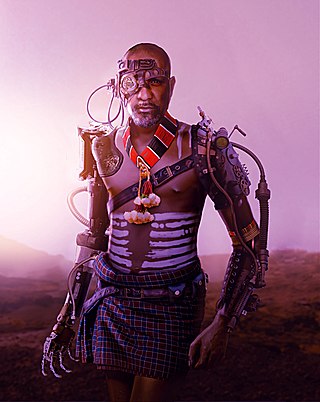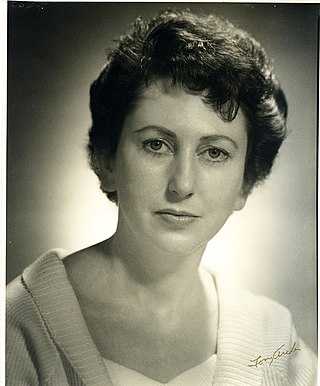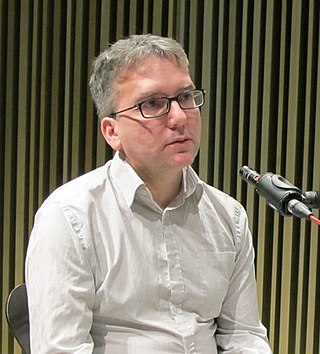
Edward St. John Gorey was an American writer, Tony Award-winning costume designer, and artist, noted for his own illustrated books as well as cover art and illustration for books by other writers. His characteristic pen-and-ink drawings often depict vaguely unsettling narrative scenes in Victorian and Edwardian settings.
Boing Boing is a website, first established as a zine in 1988, later becoming a group blog. Common topics and themes include technology, futurism, science fiction, gadgets, intellectual property, Disney, and left-wing politics. It twice won the Bloggies for Weblog of the Year, in 2004 and 2005. The editors are Mark Frauenfelder, David Pescovitz, Carla Sinclair, and Rob Beschizza, and the publisher is Jason Weisberger.

Techno-progressivism or tech-progressivism is a stance of active support for the convergence of technological change and social change. Techno-progressives argue that technological developments can be profoundly empowering and emancipatory when they are regulated by legitimate democratic and accountable authorities to ensure that their costs, risks and benefits are all fairly shared by the actual stakeholders to those developments. One of the first mentions of techno-progressivism appeared within extropian jargon in 1999 as the removal of "all political, cultural, biological, and psychological limits to self-actualization and self-realization".

Afrofuturism is a cultural aesthetic, philosophy of science, and history that explores the intersection of the African diaspora culture with science and technology. It addresses themes and concerns of the African diaspora through technoculture and speculative fiction, encompassing a range of media and artists with a shared interest in envisioning black futures that stem from Afro-diasporic experiences. While Afrofuturism is most commonly associated with science fiction, it can also encompass other speculative genres such as fantasy, alternate history, and magic realism. The term was coined by Mark Dery, an American Cultural critic in 1993 and explored in the late 1990s through conversations led by Alondra Nelson.

Erik Davis is an American writer, scholar, journalist and public speaker whose writings have ranged from rock criticism to cultural analysis to creative explorations of esoteric mysticism. He is perhaps best known for his book Techgnosis: Myth, Magic and Mysticism in the Age of Information, as well as his work on California counterculture, including Burning Man, the human potential movement, and the writings of Philip K. Dick.
Rammellzee was a visual artist, gothic futurist "graffiti writer", painter, performance artist, art theoretician, sculptor and a hip hop musician from New York City, who has been cited as "instrumental in introducing elements of the avant-garde into hip-hop culture".
The Last Angel of History is a 45-minute documentary, directed in 1996 by John Akomfrah and written and researched by Edward George of the Black Audio Film Collective, that deals with concepts of Afrofuturism as a metaphor for the displacement of black culture and roots. The film is a hybrid documentary and fictional narrative. Documentary segments include traditional talking-head clips from musicians, writers, and social critics, as well as archival video footage and photographs. Described as "A truly masterful film essay about Black aesthetics that traces the deployments of science fiction within pan-African culture", it has also been called "one of the most influential video-essays of the 1990s, influencing filmmakers and inspiring conferences, novels and exhibitions".

Kodwo Eshun is a British-Ghanaian writer, theorist and filmmaker. He is perhaps best known for his 1998 book More Brilliant than the Sun: Adventures in Sonic Fiction and his association with the art collective The Otolith Group. He currently teaches on the MA in Contemporary Art Theory in the Department of Visual Cultures at Goldsmiths College, University of London, and at CCC Research Master Program of the Visual Arts Department at HEAD.
Technoculture is a neologism that is not in standard dictionaries but that has some popularity in academia, popularized by editors Constance Penley and Andrew Ross in a book of essays bearing that title. It refers to the interactions between, and politics of, technology and culture.

Black science fiction or black speculative fiction is an umbrella term that covers a variety of activities within the science fiction, fantasy, and horror genres where people of the African diaspora take part or are depicted. Some of its defining characteristics include a critique of the social structures leading to black oppression paired with an investment in social change. Black science fiction is "fed by technology but not led by it." This means that black science fiction often explores with human engagement with technology instead of technology as an innate good.

Rohan O'Grady was the chief pen name of Vancouver-born Canadian novelist June Skinner, who was born June Margaret O'Grady. After graduating from Lord Byng Secondary School in 1940, she worked for the Capilano Golf and Country Club as assistant resident manager, and then in the library at the Vancouver Sun. At the paper she met journalist Frederick Snowden Skinner, who became her husband, and they raised their three children in West Vancouver.

Douglas Mark Rushkoff is an American media theorist, writer, columnist, lecturer, graphic novelist, and documentarian. He is best known for his association with the early cyberpunk culture and his advocacy of open-source solutions to social problems.
The Jargon File is a glossary and usage dictionary of slang used by computer programmers. The original Jargon File was a collection of terms from technical cultures such as the MIT AI Lab, the Stanford AI Lab (SAIL) and others of the old ARPANET AI/LISP/PDP-10 communities, including Bolt, Beranek and Newman, Carnegie Mellon University, and Worcester Polytechnic Institute. It was published in paperback form in 1983 as The Hacker's Dictionary, revised in 1991 as The New Hacker's Dictionary.
Arse Elektronika is an annual conference organized by the Austrian arts and philosophy collective monochrom, focused on sex and technology. The festival presents talks, workshops, machines, presentations and films. The festival's curator is Johannes Grenzfurthner. Between 2007 and 2015, the event was held in San Francisco, but is now a traveling event in different countries.

Culture jamming is a form of protest used by many anti-consumerist social movements to disrupt or subvert media culture and its mainstream cultural institutions, including corporate advertising. It attempts to "expose the methods of domination" of mass society.

Mark Fisher, also known under his blogging alias k-punk, was an English writer, music critic, political and cultural theorist, philosopher, and teacher based in the Department of Visual Cultures at Goldsmiths, University of London. He initially achieved acclaim for his blogging as k-punk in the early 2000s, and was known for his writing on radical politics, music, and popular culture.

The term Chicanafuturism was originated by scholar Catherine S. Ramírez which she introduced in Aztlán: A Journal of Chicano Studies in 2004. The term is a portmanteau of 'chicana' and 'futurism', inspired by the developing movement of Afrofuturism. The word 'chicana' refers to a woman or girl of Mexican origin or descent. However, 'Chicana' itself serves as a chosen identity for many female Mexican Americans in the United States, to express self-determination and solidarity in a shared cultural, ethnic, and communal identity while openly rejecting assimilation. Ramírez created the concept of Chicanafuturism as a response to white androcentrism that she felt permeated science-fiction and American society. Chicanafuturism can be understood as part of a larger genre of Latino futurisms.
Africanfuturism is a cultural aesthetic and philosophy of science that centers on the fusion of African culture, history, mythology, point of view, with technology based in Africa and not limiting to the diaspora. It was coined by Nigerian American writer Nnedi Okorafor in 2019 in a blog post as a single word. Nnedi Okorafor defines Africanfuturism as a sub-category of science fiction that is "directly rooted in African culture, history, mythology and point-of-view..and...does not privilege or center the West," is centered with optimistic "visions in the future," and is written by "people of African descent" while rooted in the African continent. As such its center is African, often does extend upon the continent of Africa, and includes the Black diaspora, including fantasy that is set in the future, making a narrative "more science fiction than fantasy" and typically has mystical elements. It is different from Afrofuturism, which focuses mainly on the African diaspora, particularly the United States. Works of Africanfuturism include science fiction, fantasy, alternate history, horror and magic realism.












